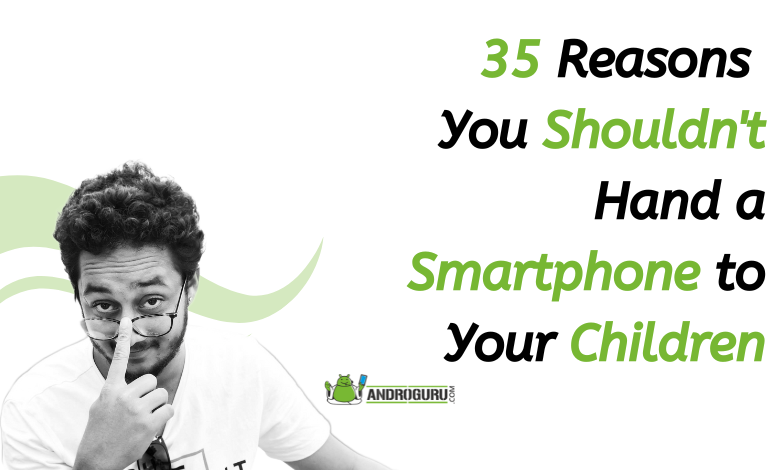35 Reasons You Shouldn’t Hand a Smartphone to Your Children
This article explores 35 reasons why handing a smartphone to your children may not be a wise decision.

Growing up, I had always been the odd one out among my peers. While many of my friends were given smartphones at a young age, my parents had a different approach. They believed in instilling a sense of independence and responsibility within me.
They never encouraged the idea of owning a phone until I was old enough and financially independent.
Their rationale was simple yet profound – they wanted me to learn the value of hard work and appreciate the privileges that come with it.
So, I embarked on my journey, eagerly looking forward to the day when I could buy a phone and lead a life on my own terms. It was a personal milestone, a symbol of my achievements and the freedom that came with it.
Little did I know at the time that this delayed introduction to smartphones would shape my perspective on technology and the role it plays in our lives.
In today’s digital age, smartphones have become ubiquitous, and it’s not uncommon to see even young children glued to these devices. However, the impact of smartphones on children’s well-being and development is a topic of concern among parents and experts.
This article delves into 35 compelling reasons why you should think twice before handing a smartphone to your children.
From potential health risks to social and emotional implications, this emotional and advisory piece aims to shed light on the potential drawbacks of excessive smartphone use among children.
- Health Risks: Excessive smartphone use has been linked to various health issues, including eye strain, sleep disturbances, and musculoskeletal problems.
- Sedentary Lifestyle: Smartphones contribute to a sedentary lifestyle, leading to decreased physical activity levels and increased risk of obesity.
- Poor Sleep Quality: Blue light emitted by smartphones can disrupt children’s sleep patterns, leading to fatigue and difficulty concentrating.
- Cyberbullying: With access to social media and messaging apps, children may become victims of cyberbullying, which can have severe psychological consequences.
- Social Isolation: Excessive smartphone use can hinder face-to-face interactions, leading to social isolation and reduced social skills.
- Distorted Self-Image: Exposure to idealized and filtered images on social media platforms can negatively impact children’s self-esteem and body image.
- Addiction and Dependency: Excessive smartphone use can lead to addiction and dependency, affecting children’s ability to engage in other activities and develop healthy coping mechanisms.
- Mental Health Issues: Research suggests a correlation between excessive smartphone use and mental health issues such as anxiety, depression, and loneliness.
- Academic Distraction: Smartphones can be a significant distraction, hindering children’s ability to focus on schoolwork and impacting their academic performance.
- Privacy Concerns: Children may unknowingly share personal information online, exposing them to privacy risks and potential exploitation.
- Decreased Attention Span: Constant exposure to smartphone notifications and multitasking can negatively impact children’s attention spans and ability to concentrate.
- Impaired Communication Skills: Excessive smartphone use may hinder the development of effective communication skills, including face-to-face interactions and nonverbal cues.
- Content Inappropriate for Children: Unrestricted access to the internet exposes children to inappropriate and potentially harmful content.
- Online Predators: Children’s unsupervised smartphone use increases the risk of encountering online predators and falling victim to grooming or exploitation.
- Impaired Empathy: Excessive smartphone use can reduce children’s ability to empathize with others and understand emotional cues.
- Decreased Productivity: Constant smartphone use can lead to decreased productivity and procrastination, impacting children’s ability to complete tasks and meet deadlines.
- Negative Impact on Relationships: Excessive smartphone use can strain relationships with family and friends, leading to decreased quality time and meaningful connections.
- Inadequate Digital Literacy: Relying heavily on smartphones may hinder children’s ability to develop essential digital literacy skills necessary for the future.
- Disrupted Family Dynamics: Excessive smartphone use can lead to disrupted family dynamics, with decreased communication and engagement among family members.
- Negative Role Modeling: Parents who excessively use smartphones may inadvertently model unhealthy behavior for their children, impacting their own relationship with technology.
- Financial Burden: Providing children with smartphones and data plans can be a significant financial burden for families, with ongoing costs and potential device replacements.
- Limited Outdoor Exploration: Smartphones can limit children’s opportunities for outdoor play and exploration, impacting their physical and cognitive development.
- Increased Risk of Accidents: Distracted smartphone use while walking or engaging in other activities can increase the risk of accidents and injuries.
- Reduced Creativity: Constant exposure to pre-packaged entertainment on smartphones can hinder children’s imagination and creative thinking.
- Unrealistic Expectations: Exposure to curated online lives on social media platforms can lead to unrealistic expectations and dissatisfaction with one’s own life.
- Peer Pressure: Children may feel pressure to conform to online trends and behaviors, potentially compromising their values and individuality.
- Academic Cheating: Smartphones can facilitate academic dishonesty, making it easier for children to access unauthorized information during exams or assignments.
- Sleepovers and Social Interactions: Excessive smartphone use during sleepovers and social gatherings can hinder genuine connections and bonding experiences.
- Limited Outdoor Safety Awareness: Constant smartphone use can decrease children’s awareness of their surroundings, potentially compromising their safety outdoors.
- Unhealthy Comparison: Social media platforms can foster unhealthy comparison among children, leading to feelings of inadequacy and low self-worth.
- Impaired Problem-Solving Skills: Relying on smartphones for instant answers can hinder children’s ability to think critically and solve problems independently.
- Decreased Resilience: Excessive smartphone use may prevent children from developing resilience and coping skills necessary for overcoming challenges.
- Unregulated Screen Time: Handing smartphones to children without clear rules and limitations can result in excessive and unregulated screen time.
- Physical Safety Hazards: Accidents related to smartphones, such as tripping while using the device or using it in unsafe locations, can pose physical safety hazards.
- Missed Opportunities for Real-World Experiences: Overreliance on smartphones can limit children’s engagement in real-world experiences, exploration, and hands-on learning.
While smartphones offer numerous benefits, it is crucial for parents to consider the potential negative consequences of excessive smartphone use among children.
This emotional and advisory article has highlighted 35 reasons why you should think twice before handing a smartphone to your children.
By setting healthy boundaries, promoting digital literacy, and encouraging a balanced approach to technology, parents can ensure that smartphones have a positive impact on their children’s lives while mitigating the potential risks.
Remember, it’s essential to guide children in developing a healthy relationship with technology, fostering their overall well-being, and facilitating their healthy growth and development.








